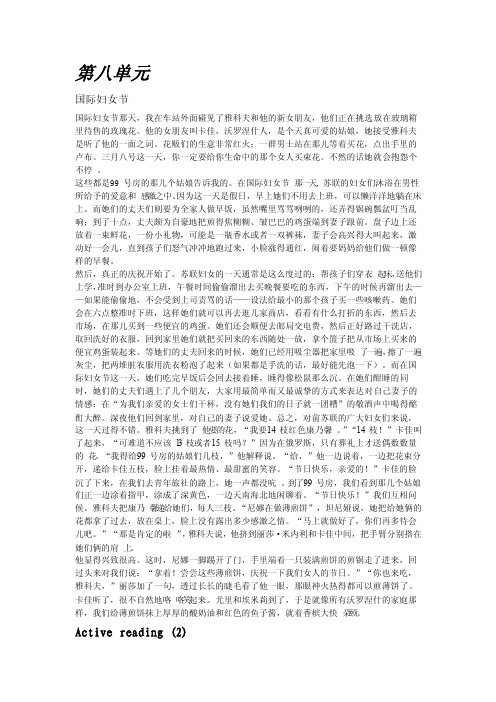新时代大学英语第三册Unit 8new
大学体验英语第三册 unit 8

Culture Notes
Palestinian Arabs' claims to the land are based on continuous residence in the country for hundreds of years and the fact that they represented the demographic majority. They reject the notion that a biblical-era kingdom constitutes the basis for a valid modern claim.
2.The African Countries
Department of College English
2. What are the causes of conflicts in the world? References
1. Expansion of Land 2. Religious beliefs 3. Racial discrimination 4. Energy 5. Border clarification 6. Beauties (Trojan War) 7. Resources 8. Arms control 9. Hegemonic 10. Terrorism 11. Trade 12.Power
Questions
Look at the following pictures and discuss with your partner: 1. Where do the wars and conflicts most frequently happen in the world nowadays? 2. What are the causes of conflicts in the world? 3. Who suffer from the wars and conflicts? And how?
新标准大学英语3第八单元课文翻译

第八单元国际妇女节国际妇女节那天,我在车站外面碰见了雅科夫和他的新女朋友,他们正在挑选放在玻璃箱里待售的玫瑰花。
他的女朋友叫卡佳,沃罗涅什人,是个天真可爱的姑娘,她接受雅科夫是听了他的一面之词。
花贩们的生意非常红火;一群男士站在那儿等着买花,点出手里的卢布。
三月八号这一天,你一定要给你生命中的那个女人买束花。
不然的话她就会抱怨个不停。
这些都是99号房的那几个姑娘告诉我的。
在国际妇女节那一天, 苏联的妇女们沐浴在男性所给予的爱意和感激之中。
因为这一天是假日,早上她们不用去上班,可以懒洋洋地躺在床上。
而她们的丈夫们则要为全家人做早饭,虽然嘴里骂骂咧咧的,还弄得锅碗瓢盆叮当乱响;到了十点,丈夫颇为自豪地把煎得焦糊糊、皱巴巴的鸡蛋端到妻子跟前。
盘子边上还放着一束鲜花,一份小礼物,可能是一瓶香水或者一双裤袜,妻子会高兴得大叫起来,激动好一会儿,直到孩子们怒气冲冲地跑过来,小脸涨得通红,闹着要妈妈给他们做一顿像样的早餐。
然后,真正的庆祝开始了。
苏联妇女的一天通常是这么度过的:帮孩子们穿衣起床,送他们上学,准时到办公室上班,午餐时间偷偷溜出去买晚餐要吃的东西,下午的时候再溜出去——如果能偷偷地,不会受到上司责骂的话——设法给最小的那个孩子买一些咳嗽药。
她们会在六点整准时下班,这样她们就可以再去逛几家商店,看看有什么打折的东西,然后去市场,在那儿买到一些便宜的鸡蛋。
她们还会顺便去邮局交电费,然后正好路过干洗店,取回洗好的衣服,回到家里她们就把买回来的东西随处一放,拿个篮子把从市场上买来的便宜鸡蛋装起来。
等她们的丈夫回来的时候,她们已经用吸尘器把家里吸了一遍,擦了一遍灰尘,把两堆脏衣服用洗衣粉泡了起来(如果都是手洗的话,最好能先泡一下)。
而在国际妇女节这一天,她们吃完早饭后会回去接着睡,睡得像松鼠那么沉。
全新版 大学英语 听说教程 第三册 听力原文 Unit 8

Unit 8Part BText 1Why Are Some People Left-handed?Research has shown that 90% of people naturally use their right hands for most tasks. But hundreds of millions of people use their left hands. Then why are some people left-handed? Scientists have been trying to answer that question for many years. A study done in 1992 found that men are more likely to be left-handed than women. It also found that Asian or Hispanic people are less likely to be left-handed than white people, black people or North American Indians. Some cultures accept people who do things mostly with their left hands. Others do not.Scientists want to know the reason for left-handedness because it is closely linked to mental problems and language difficulties. One idea about the cause of left-handedness is the genetic theory. It says that people are right- or left-handed because of genes passed to them by their parents. For example, it has been shown that the handedness of adopted children is more likely to follow that of their birth parents than their adopted parents. Other evidence of genetic involvement can be found in some families. One famous example is the left-handed members of the present British royal family. These include Queen Elizabeth II, Prince Charles and Prince William.Another idea is that right-handed people are born with the gene for it. But about 20% of people do not have the right-handed gene. These people could be either left- or right-handed. This idea may explain why two babies who have the same genes use different hands. In 18% of identical twins one twin is right-handed, and the other is left-handed. Probably both twins lack the right-handed gene so each has a chance to be either right- or left-handed.Some scientists believe that the cause of handedness could include both genetics and development.Questions:1. What is the passage mainly about?2. Which of the following topics is discussed in more detail in the passage?3. What did the speaker want to convey by an example of the present British royal family?4. What conclusion can you draw from the passage?Text 2Does Being Left-handed Affect One's Life?There are approximately 30 million left-handed people in the United States, and several hundred million more around the world. Most right-handed people have never even considered the possibility that there might be any serious issues affecting left-handers. Even among all of these left-handed people, there are many different opinions about what these issues are and which issuesmight be most important to them.Some left-handers think that being left-handed is a positive factor in their lives, and they feel that there are no serious issues affecting them. Others think that being left-handed is not a significant factor and has not affected their lives one way or another. There are also some left-handers who have no opinion and have never given any thought to what being left-handed has meant to them. But the majority of left-handed people find that being left-handed is at least a small disadvantage and a minor source of frustration in their lives.There are many things that right-handed people take for granted that are quite difficult for left-handers. These include many basic skills like learning to write, learning to use scissors and other hand tools and utensils, and learning various crafts and other activities. Sometimes left-handers are puzzled by equipment designed for right-handers, and other times they are confused by instructors and instructions geared toward teaching right-handers. For some left-handed people this amounts to occasional difficulties and minor inconveniences. For other left-handers it is a lifetime full of failures and frustrations that may lead to much more serious problems.Questions:1. What is the speaker's attitude toward left-handers?2. What can be inferred from the passage about right-handers?3. How do the majority of left-handers feel about their left-handedness?Part CLeft-handedness and Right-handedness in BabiesApproximately 90% of people in the world are naturally right-handed. Why is this so, and are we born one way or the other? The answer to this question is rather complicated.In babies and young children, no single side becomes dominant until around the age of eight. At 12 weeks, babies usually use both hands equally, but by 16 weeks, they mostly use the left hand for touching. By 24 weeks, they have changed again and start using both hands. Then at 28 weeks, they become one-handed again, although this time it is the right hand that is used more. At 32 weeks, they start using both hands again. When they reach the age of 36 weeks, there is another change, with most babies now preferring to use the left hand. Between 40 and 44 weeks, the right hand is once again more used. At 48 weeks, babies switch to using their left hands again, and then between 52 and 56 weeks, the right hand takes over.There are further changes still. At 80 weeks, the right hand loses control, and both are used again equally. When the young child reaches the age of two, the right hand takes over again, but between two and a half and three years, both hands are used equally. Things finally become stable at around four years and stay the same until, by the age of eight, one hand is strongly dominant over the other.Statements:1. At 12 weeks, both hands become dominant.2. By 24 weeks, right hand becomes dominant.3. By 36 weeks, left hand becomes dominant.4. Between 40 and 44 weeks, both hands become dominant.5. At 48 weeks, left hand becomes dominant.6. Between 52 and 56 weeks, both hands becomes dominant.7. At 80 weeks, both hands become dominant.8. At the age of two, right hand becomes dominant.9. Between two and a half and three years, both hands become dominant.10. By the age of eight, one hand is strongly dominant over the other.Part DBrain Organization and HandednessScientific studies during the 1970s and early 1980s suggested that differences in left- and right-handers' patterns of brain organization may be associated with differences in skills, abilities, and perhaps even personalities. In the large majority of right-handers, about 98 or 99 percent, speech is controlled by the left side of the brain.The right side of the brain, however, is usually used for recognizing and remembering faces and understanding relationships in space. In left-handers, it is difficult to know exactly their patterns of brain organization. About 65 to 70 percent of left-handers have speech controlled by the left side of the brain, which is also true of right-handers. But in 30 to 35 percent of left-handers speech is controlled by the right side of the brain. In some left-handers, both sides of the brain are capable of controlling speech.重点单词及词组Part BHispanic 西班牙的genetic 遗传的adopted 被收养的evidence 明显,痕迹approximately 大概地possibility 可能性positive 肯定的,实际的significant 重要的,有意义的frustration 挫败,挫折utensil 器具scissors 剪刀take for granted 想…当然Part Ccomplicated 复杂的dominant 占优势的lose control 失去控制Part Dassociate with 联合majority 多数,大半personality 个性,性格。
unit 8 cloning全新版大学英语第三册第八单元课件

12. beforehand: in advance; earlier e.g. Catherine got married without telling anyone beforehand. Mum had done most of the cooking beforehand, so we weren’t tied to the kitchen.
2. give birth to: 1) bear (a bird), bring forth e.g. Although a mother panda often gives birth to two cubs, she usually abandons one of them without attempting to care for it. The research has shown that mothers who smoke give birth more frequently to premature or underweight babies. create, originate e.g. The extraordinary experience gave birth to his latest novel. Einstein gave birth to a whole new way of looking at matter and energy. 3. for all the world: in every respect; exactly e.g. I felt for all the world as if I was still a child. He looked for all the world like a country doctor.
新标准大学英语三unit8

Text
4
在她们酣睡的同时,她们的丈夫们遇上了几个朋友, 大家用最简单而又最诚挚的方式来表达对自己妻子的情 感:在“为我们亲爱的女士们干杯,没有她们我们的日子 就一团糟”的敬酒声中喝得酩酊大醉。深夜他们回到家 里,对自己的妻子说爱她。总之,对前苏联的广大妇女们 来说,这一天过得不错。
Text
5 6
Text
她们还会顺便去邮局交电费,然后正好路过干洗店,取回洗 好的衣服,回到家里她们就把买回来的东西随处一放,拿个 桶把从市场上买来的便宜鸡蛋装起来。等她们的丈夫回来 的时候,她们已经用吸尘器把家里吸了一遍,擦了一遍灰 尘,把两堆脏衣服用洗衣粉泡了起来(如果都是手洗的话, 最好能先泡一下)。而在国际妇女节这一天,她们吃完早饭 后会回去接着睡,睡得像松鼠那么沉。
Text
On International Women's Day, I bumped into Yakov with his new girlfriend, inspecting the roses for sale in glass cases outside the station. She was called Katya, a dewy-eyed, sweet girl from Voronezh, who accepted Yakov on his own reckoning. The flower sellers were doing a busy trade; clusters of men stood waiting, counting out roubles in their hands. It was important to buy flowers for the woman in your life on 8 March. You'd never hear the end of it otherwise.
新视野大学英语精读第三册 unit eight

view : v. think about sb. or sth. in a particular way e.g. The journalist asked the minister how he viewed the recent events.
It seems probable that he will view our request with favor.
derive / get benefit from 从……中获益 hurt sb. for one’s own benefit 损人利己 mutual benefit 互利 unemployment benefit 失业津贴
have trouble doing sth. : have difficulty / problem in doing sth. e.g. Students growing up from nursery school to college have trouble dealing with realities. People usually have trouble getting their cars started in cold winter. Collocations: ask / look for trouble get into trouble have trouble with make trouble
Collocations:
one’s best to do sth. on out one’s fortune 竭尽所能做某事 试穿 试验 碰运气
try try try try
benefit: n. an advantage, improvement, or help that you get from sth. e.g. The discovery of oil brought many benefits to the town. I’ve had the benefit of a good education. 辨析: benefit, advantage & profit 这三个名词 均有“利益、好处”之意。 Benefit 普通用词,指通过正当手段从物质或 精神方面得到的任何好处或利益。 Advantage 指因某方面占优势或利用某机会以及 对方弱点而获得利益与好处。 Profit 着重收益,尤指从物质、钱财等方面 获得的利益。
全新版大学英语综合教程第三册—Unit8

Reading Tast
• • • • • • • • • • • • • • • • • • • • • [01:24.48]to think that a long list of diseases could be treated. [01:27.75]I founded the stem cell research company Stemagen [01:32.42]with another gentleman whose father had died of ALS. [01:36.48]We went out for drinks one night [01:38.80]and we started talking about our parents. [01:41.31]We wanted to do something that would be a legacy for them. [01:45.10]For Better Or Worse? [01:48.19]The moment we decided to start Stemagen, [01:53.23]I read all there was to read about the various cloning efforts in the past. [01:58.23]The cloned sheep Dolly in 1997 was very interesting, [02:03.15]but at that stage people were not focusing on the stem cell aspect of cloning; [02:08.47]they were focusing on the reproductive possibilities of cloning. [02:12.34]Human reproductive cloning [02:14.87]is just simply wrong ethically [02:17.15]from a medical standpoint and a scientific standpoint, [02:20.70]even ignoring any religious issues associated with it. [02:24.53]The reason is that the majority of reproductive clones [02:28.29]in other species are actually abnormal, [02:31.19]with very high miscarriage rates, [02:33.46]very high stillbirth rates, fetal anomalies, [02:36.78]death soon after birth, et cetera.
全新版大学英语综合教程第三册课件—Unit 8

Prometheus
In Greek mythology, Prometheus is a Titan, or the son of a Titan, and brother to Atlas and Epimetheus (afterthought). He was a champion of human-kind known for his wily intelligence, who stole fire from Zeus and gave it to mortals.
1. Molecular Cloning
Molecular cloning refers to the process of making multiple copies of a defined DNA sequence. Cloning is frequently used to amplify DNA fragments containing whole genes, but it can also be used to amplify any DNA sequence such as promoters, non-coding sequences and randomly fragmented DNA.
Genetic Engineering
In such a new field controversy inevitably abounds. Worries concerning release of genetically novel bacteria into the environment, or the possible manipulation of human embryos, have led to the setting up in the USA of the Genetic Manipulation Advisory Group (GMAG). Legislation governing genetic research has also been passed in several other countries.
- 1、下载文档前请自行甄别文档内容的完整性,平台不提供额外的编辑、内容补充、找答案等附加服务。
- 2、"仅部分预览"的文档,不可在线预览部分如存在完整性等问题,可反馈申请退款(可完整预览的文档不适用该条件!)。
- 3、如文档侵犯您的权益,请联系客服反馈,我们会尽快为您处理(人工客服工作时间:9:00-18:30)。
6
M: Are you often online, Jane? W: Sure. I like chatting with people. We talk about everything, like sports, books, movies, and even romance. It’s a real pleasure. Q: What does the woman imply? (C)
Useful Expressions and Patterns
1 2 3
4 5 6
7
internet bar 网吧 I access the Internet. 我上网。 I think ... is a waste of time. 我认为……是浪费 时间。 Are you often online? 你经常上网吗? I like chatting with people. 我喜欢和人们聊天。 Today it froze three times. 今天(计算机)死机 了3次。 Yesterday it caught a virus. 昨天(计算机)感染 病毒了。
Understand the Short Conversations
A. The woman knows more about the computer than the man. B. Both of them have realized the importance of computers. C. The man has got some trouble with his new computer. D. The woman doesn’t understand computers and got in trouble.
New Words
electronic[7ilek5trRnik]a. 电子的 1 access[5Akses]vt. 存取,接近 n. 通路,访问 2 computerize [ kEm5pju:tEraiz ] v. 3 (使)计算机化 4 *download[5daunlEud]v. 下载 5 website[5websait]n. 网站 6 freeze[fri:z]v. (计算机)死机 7 virus[5vaiErEs]n.〈微〉病毒 8 privacy [5praivEsi] n. 秘密;隐私
Understand the Short Conversations
1
A. She doesn’t like going to the Internet bar. B. She thinks the school library suitable for study. C. She seldom goes to men’s dorms to use their computers. D. She often stays in the dorm to play computer games. M: Betty, where do you go if you want to use a computer? W: I have a computer in my dorm. I can also use the computers at the school library. I seldom go to an Internet bar. Q: What does the woman imply? (A)
M: What do you think of your university, Ann? W: It’s the best, I think, just because it has a very modern information center with lots of computers with Internet access. We can use them for work and play. Q: Why does the woman like her school? (A)
Understand the Short Conversations
A. It has many computers for the students to use. B. The campus is beautiful and the teachers are nice. C. The students are given a lot of time to play. D. The library has a large collection of books.
4
M: Everything is becoming computerized these days. W: You said it. If you don’t understand computers, you’re in trouble. Q: What can we learn from this conversation? (B)
Understand the Short Conversations
10 A. She has enough money for a computer. B. The man can use her computer. C. She wants to have her own computer. D. The man should wait for some time. M: I’m so frustrated. We are supposed to do our assignments on the computer, but the ones in the information center are always busy. W: I know what you mean. I’m looking forward to the day when I can afford to get my own. Q: What does the woman mhort Conversations
Directions: In this section, you will hear 10 short conversations. At the end of each conversation, a question will be asked about what was said. Both the conversation and the question will be spoken only once. After each question there will be a pause. During the pause, you must read the four choices marked A, B, C and D, and decide which is the best answer.
Understand the Short Conversations
A. Her mother doesn’t like it. B. She can’t download movies. C. She has to pay for the Internet access. D. Her computer often goes wrong.
5
Understand the Short Conversations
A. You can easily find a nice job on the Internet. B. Online chatting can save you a lot of money. C. Chatting with people on the Internet is interesting. D. The Internet has changed the way people work.
2
Understand the Short Conversations
3
A. It saves students a lot of time. B. It brings students a lot of fun. C. It can enrich students’ knowledge. D. It affects students’ studies.
M: Helen, do you think the Internet does any good to students? W: Well. It’s hard to say. You know spending too much time on it causes some students to skip classes. Q: What does the woman think of the Internet? (D)
7
Understand the Short Conversations
8
A. She likes its color. B. It is too expensive. C. It doesn’t work well. D. She is satisfied with it.
M: Hello, Rose. Are you happy with the computer you bought recently? W: Yes. I can’t say how satisfied I am. It works very well. Q: How does the woman feel about her new computer? (D)
9
M: Why are you dissatisfied with your computer? W: Well. It gives me a lot of trouble. Today it froze three times, and yesterday it caught a virus. Q: Why is the woman dissatisfied with her computer? (D)
